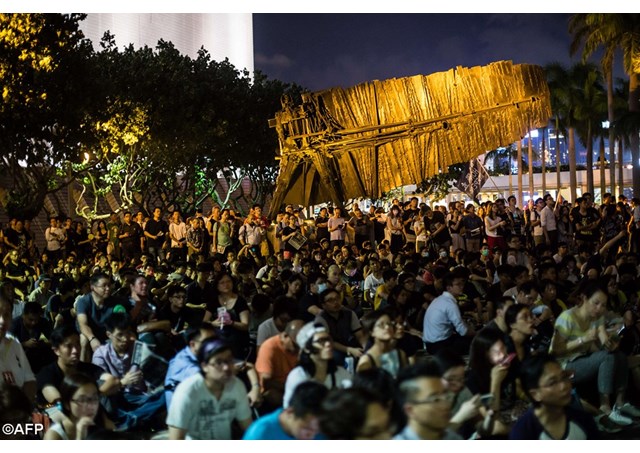
Martyrs of Tiananmen remembered at candlelight vigil

(Vatican Radio) Tens of thousands of Hong Kongers joined a candlelight vigil Thursday night marking the crushing of the 1989 student-led Tiananmen Square protests, an annual commemoration that takes on greater meaning for the city's young after last autumn's pro-democracy demonstrations sharpened their sense of unease with Beijing.
For the first time in the vigil's quarter-century history, however, some student groups didn't take part and instead held their own memorials, a sign of an emerging rift between young and old over Hong Kong identity that took root during the Occupy Central protests.
The victims of the Tiananmen massacre are "our martyrs" and we cannot "forget" them, stated Card. Joseph Zen in response to attempts to water down commemorations of the events of 4 June 1989, which had its climax in the territory in the candlelight vigil that has been held for the past 25 years in Victoria Park.
The vigil is the only large-scale public commemoration of the victims on Chinese soil, and the Tiananmen events remain a taboo topic on the mainland. Hundreds and possibly thousands of unarmed protesters and onlookers were killed when tanks and soldiers entered central Beijing on June 3-4, 1989, to put down the student-led protests.
The bishop emeritus of Hong Kong, told AsiaNews before the vigil, that in the days before the anniversary, Masses for the dead were celebrated in many churches in the area, for the "martyrs" killed in Tiananmen Square. He added that before the vigil, Catholics and Protestants were to join in a prayer meeting, which merged with the largest gathering of Victoria Park. Msgr. Joseph Ha, auxiliary bishop of Hong Kong, head of Justice and Peace, led the prayer vigil.
"Some Catholics - continues the Cardinal - say that it is time to forget, that it is useless to dwell on the past. But those young people who sacrificed their lives for the freedom did it for us. This is why we can never forget”.
Card. Zen has often explained that the fate of democracy in Hong Kong is linked to that of China. The territory is the only place in China where the events of Tiananmen are commemorated. Over the years, many from China have come to Hong Kong in order to take part in the demonstrations in memory of those killed. Many dissidents and Tiananmen Mothers (the association of relatives of those killed) are grateful for the vigil and all the activities that commemorate the movement of students and workers helplessly mowed down by the army and tanks.
This year, for the first time, the Federation of university students had decided not to officially take part in the vigil, organized by the "Hong Kong Alliance in Support of Patriotic and Democratic Movement in China", which brings together different pro- democracy groups and trade unions. Many students participated anyway, but individually.
The attitude of the Federation has been branded as a form of "localism", the tendency to see the problems of Hong Kong separately from those of China. In this way the Federation thinks it can restrain Beijing from intervening in the political affairs of Hong Kong. The Federation is frustrated because the proposal of universal suffrage for the election of the Chief Executive of the area was blocked by China, which has put in place a mechanism for the election of only three candidates "friends of China", rated by a committee of representatives where the majority is chosen by Beijing.
There were also student groups who thought differently and participated in the vigil. "June 4 and Occupy Central are very similar," said Otto Ng, a 19-year-old student who planned to attend the vigil for the first time. Ng said he hadn't known much about the events in Tiananmen Square but tried to learn more after last year's Hong Kong protests erupted. In both cases, "we are all students, and we are pushing for democracy and freedom," he said.
Eva Leung, 16, also attended the commemoration for the first time Thursday. "This evening's vigil adds to our desire to have a genuine democratic system," she said. Because of the Occupy Central protests, "I came to know what democracy is, and what was happening in Hong Kong. And it made me come to this evening's vigil."
Vigil leaders laid a wreath at a makeshift memorial in the middle of the crowd as the names of Tiananmen victims were read out. Everyone, including the crowd, then bowed three times. The leaders then led the crowd in observing a minute of silence.
Organizers planned this year to show videos about Occupy Central and speakers were to talk about mainland activists detained for voicing support. Hong Kong became a part of China in 1997 after a century and a half as a British colony but maintains freedom of speech and other civil liberties not seen on the mainland.
(Source: ABC News, AsiaNews)
| All the contents on this site are copyrighted ©. |


